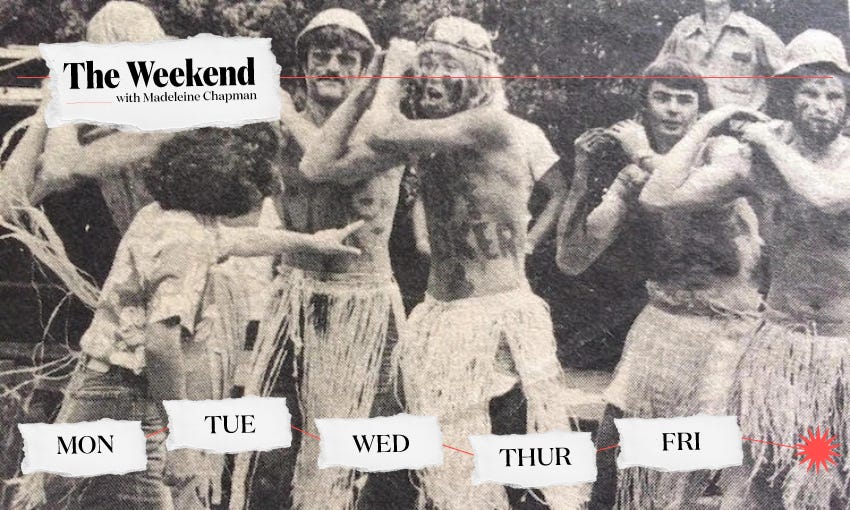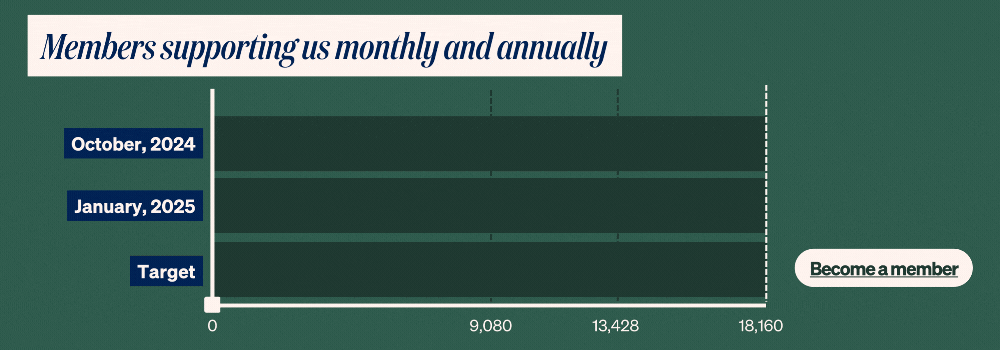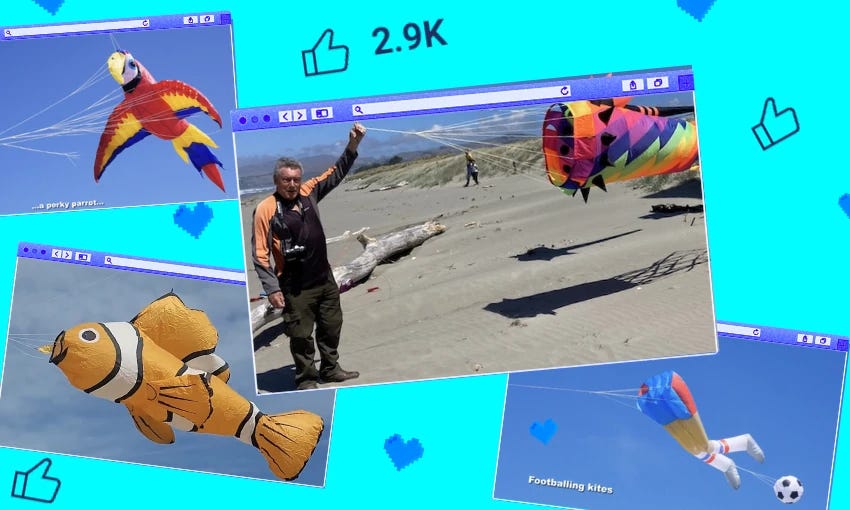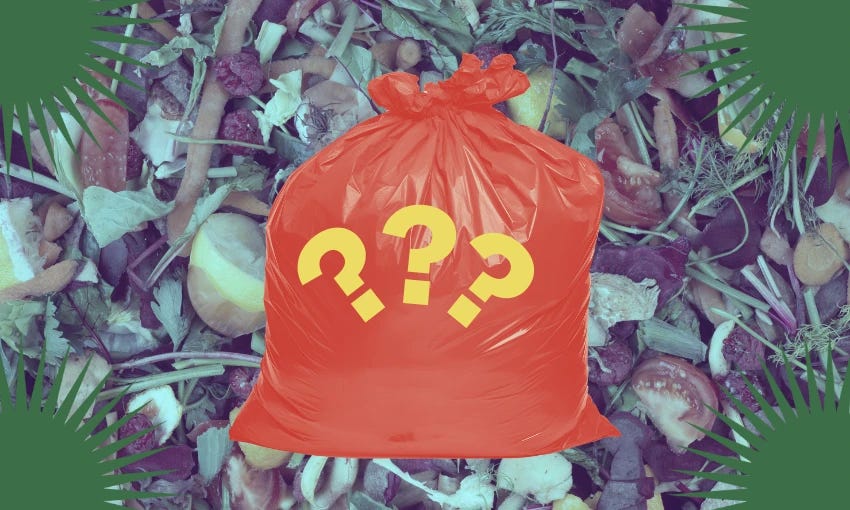Kia ora and welcome to The Weekend with Madeleine Chapman
“History repeats itself” has been repeated throughout history so often and to no avail that it’s become an ouroboros. It’s most often wheeled out as the reason to study history – to document it, analyse it and resurface it in order to not make the same mistakes over and over. It doesn’t ever seem to work but it makes for good stories.
The Haka Party Incident is an exercise in pointing at history with a raised eyebrow. The documentary, which is showing in cinemas nationwide right now, takes its name from the critically-acclaimed play, first performed in 2017. Both serve as a reminder of a short saga in New Zealand’s not so distant past, and how it has shaped and been mirrored in the New Zealand of today. Drawing from the most of the same interviews used to script the verbatim play, the documentary speaks to a number of parties involved in “the haka party incident” – in which Māori and Pasifika activist group He Taua confronted a group of Pākehā University of Auckland engineering students on the morning of their infamous “haka party”.
The Spinoff has long been a fan of the play. In fact, both reviews of it (one from 2017, another from 2021) describe it as “more documentary than theatre” in what I can only assume was intended as a high compliment from two journalists. But watching the documentary this week reminded me that every story has its perfect medium, and it’s not always the one you’d expect.
First, the good: you should watch this documentary. The best documentaries rather ironically rely on documentaries of the past, used as archive. The Haka Party Incident has some incredible archive. There’s striking images of haka parties throughout the 70s, news interviews from 1979 with He Taua members and footage from the University of Auckland forum on racism shortly after the incident. Seeing such footage played against the reflections of the subjects four decades later is the beauty of documentary, even when at times I found myself simply wanting to watch the rest of Richard Harman’s current affairs segment from 1979 or the full roundtable discussion on Māori-Crown affairs from 1985.
At its core, the film is a reminder of our national identity and for that reason alone should be seen by every New Zealander.
And yet I found myself instead thinking about the play, where seven actors played 38 characters, and the past and present existed in the same breath. Because while the play dropped its audience straight into the university quad in 1979 and it worked in its intimacy, historical documentary by its very nature requires zooming out. I waited for the contextual corkboard to be laid out on which to pin the central incident but it never came. No mention of political leaders at the time, recent historical events or possible previews to what happened on May 1. The film strayed from the play in its ending by introducing present day political events and specifics for modern context, but I would’ve loved to see that replicated in its opening.
The most compelling (for lack of a better word) moments in the film are the interviews with the engineering students, now in their sixties. Their reflections and (lack of) introspection about the incident and racism in New Zealand is frustrating and yet you find yourself feeling grateful to the men for allowing themselves to be part of this education for everyone else. There had been moments in the play that felt almost caricatured but seeing them on screen revealed the truth in every actor’s performance.
Every story has the perfect medium that makes it unforgettable, whether it’s a film, book, painting, play, essay or tweet. Often, we hear or tell a story through the wrong medium (the articles under my name that should’ve been texts and the texts that should’ve been thoughts… ) For those 10,000 New Zealanders who learned about the haka party incident in a live theatre, I suspect that is what will stay with you and the documentary will serve as supplementary material, which is technically how it was conceived. Or maybe in three years there’ll be a podcast and we’ll realise it should’ve been that all along. With cultural funding staring down a slippery slope, having options for how we consume a story may soon be a luxury of the past, so we are lucky to have them with this one.
For me, the play and its juxtapositions and heart is what will stay with me. For others, the documentary and its visual punches will reign supreme. Both should exist and be celebrated. Whatever helps us remember.
This week on Behind the Story
The Spinoff enters the press gallery
This week was the first week back for politicians in parliament, which meant a big week for anyone reporting in the gallery. Newly minted Spinoff political reporter Lyric Waiwiri-Smith spent 12 hours listening to oral submissions to the select committee on the treaty principles bill, and started her new column Echo Chamber, which recaps the lively question times in the House for those too busy to watch parliament TV. Lyric joined Madeleine Chapman on Behind the Story to share how she’s settling in and what her aspirations are for the next six months in the gallery.
We still need your help
Our extensive coverage of Waitangi 2025 is powered by the nearly 16,000 people who give to us on a monthly or annual basis or who have donated on a one-off basis. It was unimaginable before so many of you met our honesty with your generosity after our open letter in November.
We still need 4,500 new members to join us this year to ensure our future and continue the comprehensive, rigorous and thoughtful coverage of the things that matter to our audiences.
Please, if you value comprehensive coverage of Waitangi and Te Tiriti and you’re not a member, make this week the week you sign up again.
Amber Easby, CEO,
Duncan Greive, Founder
Madeleine Chapman, Editor
Meet New Zealand’s 84-year-old kite influencer
Head to Christchurch’s New Brighton on any summer’s day and you are likely to check a few things off your beachside bingo card. There’ll be a couple of fishermen casting off the pier, kids splashing around in the fountain-filled playground, and diners clinging to their fish and chip wrappers in the wind. What you might not expect to see is an 84-year-old man confidently conducting a cavalcade of critters including a 40-foot long centipede, a 33-foot giant squid and a 60-square-foot Spongebob Squarepants. Alex Casey spent the afternoon in with 84-year-old kite Youtuber Jim Nicholls, and lived to tell the tale.
What’s ahead for kerbside food waste collection?
Nearly two years after food scraps collection was rolled out in New Zealand’s biggest city, a government policy change might prevent other councils from following suit. Four of the five big-picture waste minimisation policies supported by the ministry would no longer be mandatory, including extending kerbside organics collection to all councils. Shanti Mathias explains how this will likely make implementing food scraps collection less urgent for councils, and why, despite all the drawbacks and imperfections of kerbside food waste collection, waste experts still think it’s worth doing.
Join us live in 2025
We have four fantastic live events in 2025. Join us in Auckland and Wellington for The Spinoff Live.
Auckland at Q Theatre: Bryn & Ku’s Singles Club Party, February 13 and Gone by Lunchtime Live, April 9.
Wellington at the Hannah Playhouse: The Fold Live, February 20 and The Spinoff Book Club, March 13.
The south gets its hospital
The minister of health visited Dunedin on Friday to announce an update to the hospital project. Tara Ward was there.
“Simeon Brown stood in the corner of the room with his hands clasped in front of him. Beside him was a table stacked with several bright orange hard hats and neatly folded orange hi-vis vests, and behind him stood two representatives from Health New Zealand. ‘How is everyone today?’ Brown asked the gathered Dunedin media. ‘We’ll tell you in a minute,’ a voice from the back answered. ‘Very good. Excellent. Cool,’ Brown replied.
The stories Spinoff readers spent the most time with this week
Lyric Waiwiri-Smith and Joel MacManus report from Select Committee Room 3 on what you missed from day one of the Treaty principles bill hearings. (We also covered the second day)
The documentary Prime Minister, about Jacinda Ardern, just premiered at Sundance. Here’s what the critics, and the subject herself, are saying
Self-proclaimed yes-man Luxon has a culture of saying no to housing in Wellington, writes Joel MacManus
Gareth Hughes argues there’s reasons to be sceptical of chasing economic growth as the answer to what ails us
When public services are failing, it’s easy to look to privatisation. Max Rashbrooke argues that is a failure of the imagination
Recommended reads for your weekend
Critics are calling the $6m spent on the Treaty principles bill process a waste, but Liam Rātana asks if it could offer long-term clarity
Gabi Lardies asks what ‘winged wētā’ are and if they are taking over
The police counted 42,000 at the hīkoi. But how? Toby Manire reveals the OIA response
Director and writer Harry Wynn reflects on making Queer Aotearoa: We’ve Always Been Here, a groundbreaking documentary series
Ever wondered what prickles are and why they’re everywhere? Gabi Lardies has the answers
Alex Casey has found the only good place left on social media - Sam Neill’s farm
Is it possible to grow out big summer festivals? Liv Sisson debates Liv Sisson
It’s here! The 2025 Ockham New Zealand Book Awards longlist has dropped
A gaping pit of sadness opened in Alex Casey’s stomach at the 90s Mania concert featuring Vengaboys in Christchurch’s Town Hall
A 41-year-old Auckland renter, struggling to buy a house explains her budget in this week’s Cost of Being
Claire Mabey and Lyric Waiwiri-Smith swap notes after staring into the crystal orbs of Te Papa’s Vivienne Westwood exhibition
Reader feedback of the week
On Have big summer festivals stopped being fun? An argument with myself
“As a fellow Twisted attendee and an ex-goer of commercialised festivals, you just can't beat the warm embrace of Twisted. Friendly, shared energy, a plethora of music for all tastes, the river!!! I've been three times, and it just gets better. No cell service, camp at beside your cars/in your cars, can bring cookers/BBQs. A huge focus on the environment - both to take care of it, and take care of each other. And a huge plus for me is the lack of focus around alcohol and because people aren't drinking as much, the whole vibe is more pleasant. Sure it isn't as 'underground', but it still attracts a certain type of music lover/festival goer. Glad you had a good time :)”
On Browny’s pool was a gamble and it’s paid off
“I like the pool, and I'm glad that the mayor championed it.
Can we acknowledge that Eke Panuku were already well underway looking at improving swimming areas downtown, including this upgrade to Karanga Tidal Steps, before Wayne Brown even ran for office.
No doubt the support from Brown expedited it happening. But I find it distasteful the way he happily claims all credit for this, without acknowledging Eke Panuku's role in planning and delivering the work. In fact, it's quite the opposite: he berates Eke Panuku publicly and has now dismantled then entirely.
Dude needs to learn to say thank you and support his team”
Thanks for reading. See you next week.















There is something about live theatre - being the same size and breathing the same air as the actors, perhaps? - that encourages empathy (when it's done well). Also our level of engagement increases because we mentally and emotionally do the 'panning' and 'zooming' that screen directors/ cinematographers/ editors do for us. Live theatre is always interactive.
🤔 Vague vague vague echoes about the Haka Party incident... Sounds like I need to go see the doco as the trailer is disturbing (as in the pale male stale persisting attitudes 🤮) It is also a (little) bit affirming as to how far we've come in Aotearoa to reflect that this would outrage far more people today (the parties not the protests🤨) despite the rise to power of the Seymours et al trying to say being Maori means getting privileged treatment rather than the privilege of being Maori is actually being Maori per se - cultural & historical support & grounding if we care to access it. 💪